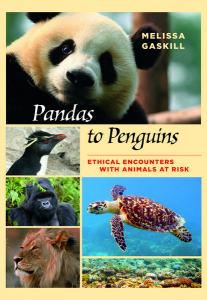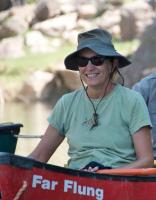Melissa Gaskill, Pandas to Penguins
For this column, NASW book editor Lynne Lamberg asks NASW authors to tell how they came up with the idea for their book, developed a proposal, found an agent and publisher, funded and conducted research, and put the book together. She also asks what they wish they had known before they began working on their book, what they might do differently the next time, and what tips they can offer aspiring authors. She then edits the A part of that Q&A to produce the author reports you see here.
Publication of NASW members’ reports in Advance Copy does not constitute NASW’s endorsement of their books. NASW welcomes your comments, and hopes this column stimulates productive discussions.
PANDAS TO PENGUINS:
ETHICAL ENCOUNTERS WITH ANIMALS AT RISK
Melissa Gaskill
Texas A&M University Press, September 12, 2018, $28.00
ISBN 10: 1623496691; ISBN 13: 978-1623496692
Gaskill reports:
We’ve all seen tourists behaving badly with wildlife – the beachgoers passing around a baby dolphin to take selfies, park visitors chasing wildlife to get photos, people visiting tourists sites in foreign countries where you can pet a baby tiger. None of these experiences end well for the animal.
I have a long-standing interest in the intersection of travel and conservation, particularly places where the former supports the latter. I previously wrote a book about how the sea turtle science and conservation community uses tourism to support projects in places around the world (see A Worldwide Travel Guide to Sea Turtles, TAMU Press, 2014).Pandas to Penguins expands on that theme, inspired by my own trips in South Africa, Australia, and around North America and the Caribbean to places where people can see iconic animals in the wild and help protect them and their habitat at the same time.
I approached my editor at TAMU Press about the idea and then worked to select specific animals to include. That part got tricky, as I wanted places where people had a reasonable chance to see the animal in the wild and where you could do so with responsible outfitters who followed ethical practices–no handling animals or keeping them in captivity–and supported the local economy, too. We also wanted opportunities spread out around the globe.
I include information about each species and the threats to its survival, as well as first-person accounts of the trips to see them. In the past ten years or so, I have seen wolves in Yellowstone National Park, thousands of sandhill cranes on the Platte River in Nebraska, wild lions in South Africa, and coral species that make up the Great Barrier Reef off the coast of Australia, to name a few. I wish I could say I have seen all the animals described in the book in their natural settings. When I was not able to do that, I spoke with outfitters and organizers about their experiences.
Contact info:
- Melissa Gaskill, 512-468-0774, gaskillml@gmail.com
- Blog: http://melissagaskill.blogspot.com/
- Book: https://www.tamupress.com/book/9781623496692/pandas-to-penguins/
- Publicist: Christine Brown, 979-458-3982, christinebrown@tamu.edu
NASW members: will your book be published soon? Take advantage of this opportunity for shameless self-promotion. Submit your report for Advance Copy.
Tell your fellow NASW members how you came up with the idea for your book, developed a proposal, found an agent and publisher, funded and conducted research, and put the book together. Include what you wish you had known before you began working on your book, or had done differently.
See https://www.nasw.org/advance-copy-submission-guidelines.
View Advance Copy archives at https://www.nasw.org/member-article/advance-copy.
Thinking of writing a book? If you are a NASW member, you may access a list of more than 150 books and online resources to help you craft your book proposal, find an agent and funding sources, negotiate your contract, learn about self-publishing, publicize and market your book, and more at https://www.nasw.org/article/write-book.
Send book info and questions about book publishing to Lynne Lamberg, NASW book editor, llamberg@nasw.org.


